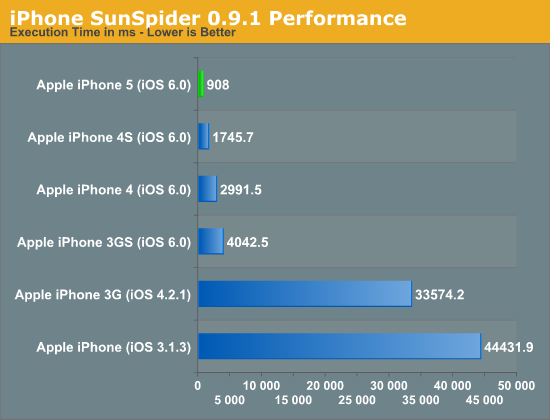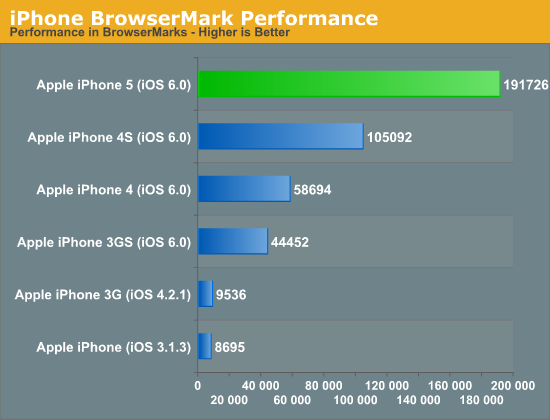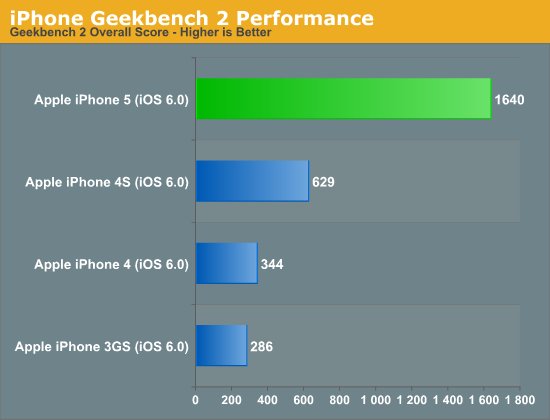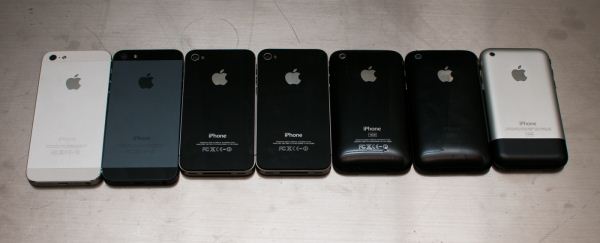The iPhone 5 Review
by Anand Lal Shimpi, Brian Klug & Vivek Gowri on October 16, 2012 11:33 AM EST- Posted in
- Smartphones
- Apple
- Mobile
- iPhone 5
Six Generations of iPhones: Performance Compared
Section by Anand Shimpi
Cross platform smartphone benchmarks are interesting, but they do come with their own sets of issues. Before we get to that analysis however, let's look at how the iPhone's performance has improved over the past six generations. Luckily Brian has a set of all of the iPhones so he was able to run a few tests on all of the devices, each running the latest supported OS.
We'll start with SunSpider 0.9.1, our trusty javascript performance test:

The transition from iPhone to iPhone 3G shows you just how much additional performance you can squeeze out of simply a software change. There's likely even more that could be squeezed out of that ARM11 platform, unfortunately newer versions of Safari/iOS aren't supported on the iPhone 3G so we're left with a runtime that's around 37x the length of a single run on the iPhone 5.
The rest of the devices support and run iOS 6, so we're at least on a level software playing field. The performance boost from one generation to the next is quite significant still. Going by this chart alone, the best balance of minimal upgrades and maximum perceived improvement would be from the original iPhone to the 3GS then again from the 3GS to the 5.

The BrowserMark results tell a similar story. The jump from the ARM11 based iPhone/iPhone 3G to the 3GS running iOS 6 is huge. Both the 4S and 5 offer doublings in performance, albeit for different reasons. The 4S delivered a doubling thanks to a doubling of core count and a move to the Cortex A9, while the iPhone 5 doubled performance through a much higher clock speed and microarchitectural improvements.
Finally we have Geekbench 2, which only runs on the iOS 6 supported devices so we say goodbye to the original iPhone and iPhone 3G:

None of the jumps looks as dramatic as the move to the iPhone 5, but we already know why. The Swift CPU architecture does a great job improving memory performance, which shows up quite nicely in a lot of the Geekbench 2 subtests.
On the PC side we often talk about 20% performance improvements from one generation to the next being significant. It's clear that the mobile SoC space is still operating along a hyper Moore's Law curve. The rate of progress will eventually slow down, but I don't see that happening for at least another couple generations. The move to ARM's Cortex A15 will be met with another increase in performance (and a similarly large set of power challenges), and whatever comes next will push smartphones into a completely new category of performance.












276 Comments
View All Comments
A5 - Tuesday, October 16, 2012 - link
Double the browsing time while moving to LTE and roughly the same in everything else despite double the performance is pretty impressive.rarson - Thursday, October 18, 2012 - link
I'm pretty sure they mentioned about a million times that "this is the new paradigm blah blah blah, where if you use heavy processing power more often, the battery life will diminish faster" (I'm paraphrasing here). I'm fine with that. The iPhone 5 shows some pretty impressive battery life in light workloads and doesn't actually do all that bad in heavy workloads despite how much number crunching it's doing, even though it might actually tank the battery life down to less-than-4S levels.It's a tradeoff: you get more power or longer battery life, depending on how you use it. The article paints this as a bad thing, but I disagree; it's obviously making much more efficient use of the hardware. Because of that, I definitely think the battery life overall is better, even though sometimes it might be worse. And you're still getting a lot more number crunching for the watts used.
Center - Tuesday, October 16, 2012 - link
In the intro, the screen specs on the iphone 5 is listed as 1136x960.. should be 1136x640.But great article as always, Anandtech!
Krysto - Tuesday, October 16, 2012 - link
I hope we'll see the same kind of thorough review of Samsung's Exynos 5 Dual chip, Anand.ltcommanderdata - Tuesday, October 16, 2012 - link
Isn't TI supposed to become the first shipping Cortex A15 SoC? I expect Anandtech to thoroughly review the first Cortex A15 SoC. There shouldn't be a need to go into the same detail (on the CPU side) for every subsequent one unless preliminary tests show something significantly different.Kidster3001 - Monday, October 22, 2012 - link
Samsung and Qualcomm do not ship generic ARM chips. They purchase licenses to use the ARM instruction set, not the chip design. Their chips are highly customized and perform differently.Using your logic to just review the first A15 class chip and consider the rest to be comparable is similar to just reviewing the first new car to be released every year and assume the rest will be comparable.
btw, TI is getting out of the business. I doubt they will ship first, or ever.
A5 - Tuesday, October 16, 2012 - link
Considering the fact that Krait got several articles here, I'd imagine that whatever the first shipping A15 chip is will get significant coverage.Wurzelsepp - Tuesday, October 16, 2012 - link
Great review, you really have to give Apple credit for building an amazing SoC.It's interesting to see how well the Adreno competes with SGX-543MP3, the new Nexus 4 with this GPU is going to be amazing.
Krysto - Tuesday, October 16, 2012 - link
One thing both the iPhone and the Intel Atom processors will keep lacking for a year from now, will be OpenGL ES 3.0 support. Apple might bring it to the new iPad 4 this spring, but the iPhone won't have it until the next iPhone, in the fall of 2013, obviously. Same with Intel, they won't be supporting it at least until end of 2013.In the meantime both Adreno 320 and Mali T604 are supporting it, and will come out this fall.
darwinosx - Tuesday, October 16, 2012 - link
A year from now and something 'coming out this fall". Right.